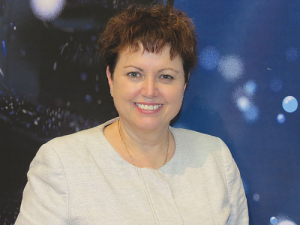NZ Catchment Groups Thrive with ‘Source to Sea’ Approach
The most successful catchment groups in NZ are those that have 'a source to sea' approach.
 Massey University vice-chancellor Jan Thomas says the NZ agri-sector needs to portray itself as in innovative, high-value food producer.
Massey University vice-chancellor Jan Thomas says the NZ agri-sector needs to portray itself as in innovative, high-value food producer.
New Zealand must get beyond seeing its agri sector as ‘gumboots in the mud’ and portray itself as a high value-food producer using innovative technologies.
That’s the view of Massey University vice-chancellor Jan Thomas. She says because NZ has limited agricultural land it must focus on high-quality dairy, meat and horticultural products.
The emphasis on clean, green and food provenance is a help, she says, but an opportunity exists to take this to a higher level with functional foods and things wanted by the rising middle classes of the world.
“We have traditionally seen food as an energy source that provides us with vitamins that keep the body running. But now with technology advancements you can get functional foods which have particular added benefits in health outcomes,” Thomas told Rural News.
“Take a standard crop such as a plum: you can just have a bowl of plums on your table, or you could breed a variety of plum with particular technical elements that help prevent blood pressure and heart and vascular disease, so increasing health outcomes.”
Thomas says Massey University is researching meat substitutes that will appeal to some consumers, but the aim is to diversify rather than substitute; there are many more consumers who value a high quality steak.
Planning for an unseen future
Consumer tastes and demands are changing and the rules on farming systems are also in the spotlight, says Jan Thomas.
So Massey University must train graduates for jobs that don’t exist now but will in the future. She forsees a need for more engineering and computer science graduates.
Students are encouraged to spend time in industry to gain understanding of what they will head into when they graduate. “We want our graduates not only to have a good understanding of how to work in the industries and communities they serve, but also to be able to adapt nimbly to ways of work we don’t yet understand,” Thomas told Rural News.
“We will see a transformation of that work and we want our graduates to ride that wave, be entrepreneurial and be able to create jobs for others. That’s our long term goal which is a brave and big one but we are working hard at it and its going well.”
Thomas says consumers are taking more interest in the science that creates food and she’s encouraging academics at Massey University to get out into the community and tell people how science and technology can benefit every aspect of life.
The Meat Industry Association of New Zealand (MIA) today announced that Chief Executive Officer Sirma Karapeeva has resigned from the role.
The winners of the 2026 Hawke’s Bay/Wairarapa Dairy Industry Awards were announced at the annual awards dinner held at Copthorne Solway Park in Masterton on Thursday evening.
Environment Southland is welcoming this week’s decision by the Environmental Protection Authority (EPA) to approve the release of Blaptea elguetai, a leaf‑feeding beetle that will help control the highly invasive Chilean flame creeper.
This March, the potato industry is proudly celebrating International Women’s Day on 8 March alongside the International Year of the Woman Farmer, recognising the vital role women play across every part of the sector — from paddocks and packhouses to research, leadership, and innovation.
Fruit trader Seeka posted a record profit and returns to shareholders in 2025.
Recent weather events in the Bay of Plenty, Gisborne/Tairawhiti, and Canterbury have been declared a medium-scale adverse event.

OPINION: A mate of yours truly reckons rural Manawatu families are the latest to suffer under what he calls the…
OPINION: If old Winston Peters thinks building trade relations with new nations, such as India, isn't a necessary investment in…